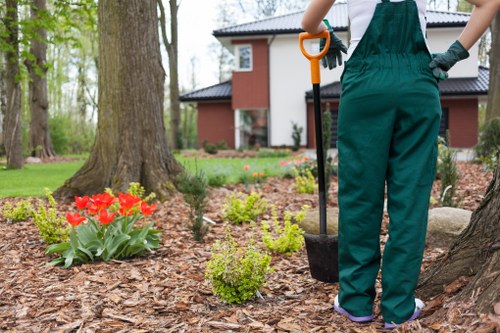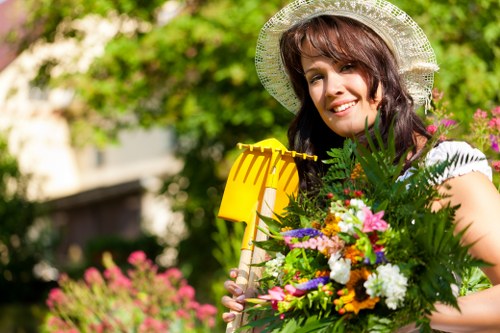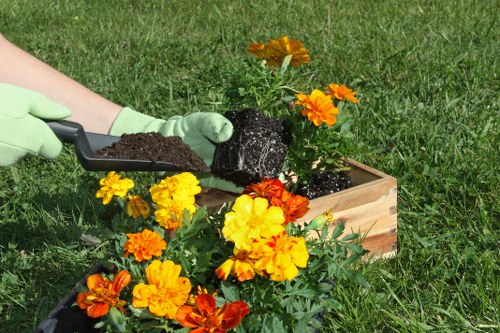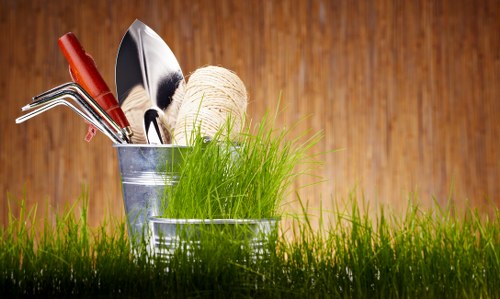Landscape Gardening in Uxbridge: Transforming Outdoor Spaces

Introduction to Landscape Gardening in Uxbridge
Landscape gardening in Uxbridge is an exquisite blend of art and science, aimed at enhancing the beauty and functionality of outdoor spaces. Whether you’re looking to revamp your backyard, create a serene garden retreat, or boost your property’s curb appeal, landscape gardening offers numerous benefits for homeowners in this vibrant town.
Uxbridge boasts a unique climate and diverse soil conditions, making it essential to choose the right plants and materials for your garden. Understanding these local factors can help you create a landscape that not only looks stunning but also thrives year-round.
In this article, we will delve into the various aspects of landscape gardening in Uxbridge, covering design principles, plant selection, maintenance tips, and the latest trends. Our aim is to provide you with comprehensive insights to help you create a beautiful and sustainable outdoor environment tailored to your needs.

Design Principles for Effective Landscaping
Balance and Harmony
Achieving balance and harmony is fundamental in landscape gardening. This involves the even distribution of visual weight, ensuring that no single element overwhelms the others. Balanced designs can be symmetrical or asymmetrical, each offering a distinct aesthetic appeal.
Harmony ensures that all components of the garden work together seamlessly. This includes the integration of plants, hardscaping elements like paths and patios, and decorative features such as fountains or sculptures. A harmonious garden feels cohesive and well-planned.
By focusing on balance and harmony, you can create a landscape that is both aesthetically pleasing and functionally practical, providing a welcoming space for relaxation and enjoyment.

Choosing the Right Plants for Your Uxbridge Garden
Climate-Compatible Species
Selecting plants that are well-suited to Uxbridge’s climate is crucial for a thriving garden. Opt for native species that are adapted to the local weather patterns, soil types, and pests. Native plants often require less maintenance and are more resilient against environmental stresses.
Consider the hardiness zone of Uxbridge to determine which plants will flourish. For instance, perennials like lavender and hostas are excellent choices for adding color and texture to your garden, while evergreen shrubs provide year-round structure and greenery.
Additionally, incorporating a mix of flowering plants, shrubs, and trees can create a layered and dynamic landscape. This diversity not only enhances visual interest but also supports local wildlife and promotes ecological balance.

Incorporating Sustainable Practices
Water Conservation Techniques
Sustainability is a key consideration in modern landscape gardening. Implementing water conservation techniques such as drip irrigation, rainwater harvesting, and mulching can significantly reduce water usage while maintaining a healthy garden.
Using native and drought-tolerant plants can further enhance your garden’s sustainability. These plants require less water and are better adapted to the local climate, minimizing the need for frequent watering and maintenance.
Moreover, integrating composting and organic fertilizers can improve soil health, reduce chemical runoff, and promote a more sustainable gardening practice. These eco-friendly methods contribute to a greener and more resilient landscape.

Latest Trends in Uxbridge Landscape Gardening
Smart Garden Technology
The integration of technology into landscape gardening is a growing trend in Uxbridge. Smart irrigation systems, automated lighting, and garden sensors can enhance the efficiency and functionality of your outdoor space.
These technologies allow for precise control over watering schedules, lighting conditions, and soil moisture levels, ensuring that your plants receive the optimal care they need to thrive.
Additionally, the use of sustainable materials and innovative design concepts, such as vertical gardens and native plant landscapes, are gaining popularity. These trends not only improve the aesthetic appeal of gardens but also support environmental sustainability.
Planning Your Landscape Garden
Assessing Your Space
Before embarking on a landscape gardening project, it’s essential to assess your existing outdoor space. Consider factors such as sunlight exposure, soil quality, drainage, and the overall layout. Understanding these elements will help you make informed decisions about plant selection and garden design.
Creating a detailed plan or blueprint can also aid in visualizing the final outcome. Sketching out the placement of key features like patios, walkways, and focal points can streamline the design process and ensure that your garden meets your functional and aesthetic goals.
Engaging with a professional landscape gardener in Uxbridge can provide valuable insights and expertise, ensuring that your garden is both beautiful and sustainable.
Maintenance Tips for a Thriving Garden
Regular Care and Upkeep
Maintaining your landscape garden requires regular care and attention. This includes watering, pruning, fertilizing, and pest control. Establishing a consistent maintenance routine can help keep your garden healthy and vibrant throughout the year.
Mulching is an effective practice that helps retain soil moisture, suppress weeds, and regulate soil temperature. Additionally, periodic soil testing can provide insights into nutrient levels, allowing you to amend the soil as needed for optimal plant growth.
Seasonal tasks such as leaf removal, plant staking, and winter preparation are also important for ensuring the longevity and resilience of your garden. By staying proactive with maintenance, you can enjoy a flourishing landscape all year round.
Enhancing Aesthetics with Hardscaping
Pathways and Patios
Hardscaping elements like pathways and patios play a significant role in defining the structure and flow of your garden. These features provide functional spaces for walking, dining, and entertaining, while also adding visual interest and texture to the landscape.
Choosing the right materials, such as stone, gravel, or pavers, can complement the overall design aesthetic and enhance the durability of these structures. Incorporating curved paths and strategically placed seating areas can create a more inviting and harmonious outdoor environment.
Additionally, integrating features like pergolas, decks, and garden walls can provide support for climbing plants and create designated zones for different activities, further enhancing the functionality and beauty of your landscape garden.
Incorporating Water Features
Fountains and Ponds
Water features such as fountains and ponds can add a sense of tranquility and elegance to your landscape garden. The sound of flowing water creates a calming atmosphere, while the visual appeal of water elements enhances the overall aesthetic.
When selecting a water feature, consider the size and scale of your garden. Smaller spaces may benefit from compact fountains or birdbaths, while larger gardens can accommodate ponds or cascading waterfalls.
Proper maintenance is essential to keep water features functioning smoothly. Regular cleaning, water treatment, and equipment checks will ensure that your water elements remain a beautiful and sustainable part of your garden.
Lighting Your Landscape Garden
Illuminating Pathways and Features
Outdoor lighting is a crucial aspect of landscape gardening, providing both safety and aesthetic appeal. Well-placed lights can highlight garden features, illuminate pathways, and create a magical ambiance in the evenings.
There are various types of outdoor lighting to consider, including solar lights, LED fixtures, and low-voltage systems. Each option offers unique benefits in terms of energy efficiency, installation ease, and design flexibility.
Strategically positioning lights around key elements like trees, statues, and water features can enhance their visual impact and create a captivating night-time landscape. Additionally, incorporating motion sensors and timers can improve energy efficiency and security.
Sustainable Garden Practices
Eco-Friendly Materials
Sustainability in landscape gardening goes beyond plant selection. Using eco-friendly materials such as recycled pavers, natural stone, and sustainable timber can reduce the environmental footprint of your garden project.
Incorporating composting systems and rain gardens can further enhance the sustainability of your landscape. These practices help manage waste, improve soil health, and reduce stormwater runoff, contributing to a healthier ecosystem.
Additionally, opting for organic gardening methods and avoiding chemical pesticides and fertilizers can promote biodiversity and create a more resilient and sustainable garden environment.
Seasonal Planting Strategies
Adapting to Uxbridge's Climate
Adapting your planting strategy to the changing seasons is essential for maintaining a vibrant and thriving garden in Uxbridge. Planning for seasonal blooms ensures continuous color and interest throughout the year.
In spring, focus on planting bulbs and early-flowering perennials such as tulips and daffodils. Summer is ideal for vibrant annuals and hardy perennials like roses and lavender. Fall brings rich foliage and late-season blooms, while winter provides opportunities for structural interest with evergreens and ornamental grasses.
By selecting a diverse range of plants that thrive in different seasons, you can create a dynamic and resilient landscape that remains beautiful and engaging all year long.
Maximizing Small Garden Spaces
Creative Design Solutions
Even with limited space, you can achieve a stunning landscape garden in Uxbridge by employing creative design solutions. Vertical gardening, container planting, and multi-functional features can maximize the utility and aesthetic appeal of small gardens.
Using trellises and vertical planters allows you to grow climbing plants and create lush green walls, adding depth and dimension to your garden. Container gardens offer flexibility and mobility, enabling you to experiment with different plant arrangements and easily change your garden layout.
Additionally, incorporating multi-functional elements such as seating walls, integrated lighting, and compact water features can enhance the functionality and charm of small garden spaces.
Benefits of Professional Landscape Gardening
Expertise and Experience
Engaging a professional landscape gardener in Uxbridge brings a wealth of expertise and experience to your garden project. Professionals can provide valuable insights into design, plant selection, and sustainable practices, ensuring that your garden is both beautiful and functional.
They can help you avoid common pitfalls, optimize your garden layout, and implement effective maintenance strategies. Additionally, professionals have access to a wider range of resources and materials, enabling them to create customized solutions tailored to your specific needs.
By leveraging their knowledge and skills, you can achieve a high-quality landscape garden that enhances your property’s value and provides lasting enjoyment.
Conclusion: Embrace the Beauty of Landscape Gardening in Uxbridge
Landscape gardening in Uxbridge offers a transformative way to enhance your outdoor living spaces. By applying thoughtful design principles, selecting the right plants, and embracing sustainable practices, you can create a garden that is both stunning and resilient.
Whether you’re a seasoned gardener or just starting, the expertise and resources available in Uxbridge can help you achieve your landscaping goals. From innovative trends to timeless classics, there are endless possibilities to explore and incorporate into your garden.
Contact us today to begin your landscape gardening journey in Uxbridge. Our team of experienced professionals is ready to assist you in designing and maintaining a garden that reflects your personal style and meets your functional needs.
Book your service now and take the first step towards a beautiful, sustainable, and thriving outdoor space.

